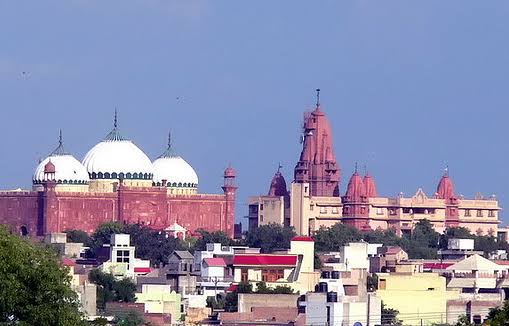
Petition in Mathura court to remove mosque, 'reclaim' Krishna temple land
Lawyers Hari Shankar Jain and Vishnu Jain have filed the petition, on behalf of Hindu deity Shrikrishna Virajman, through Ranjana Agnihotri and six others, demanding complete control of 13.37 acre 'Sri Krishna Janmabhoomi' land and the removal of Shahi Eidgah mosque that stands adjacent to the temple.

Days after the Ayodhya land dispute was resolved, a suit has been filed in the Mathura civil court to “reclaim” the entire Krishna Janmabhoomi in Mathura claiming that “every inch of the land… is sacred for the devotees of Lord Shree Krishna and the Hindu community.”
Lawyers Hari Shankar Jain and Vishnu Jain have filed the petition, on behalf of Hindu deity Shrikrishna Virajman, through Ranjana Agnihotri and six others, demanding complete control of 13.37 acre ‘Sri Krishna Janmabhoomi’ land and the removal of Shahi Eidgah mosque that stands adjacent to the temple.
The respondents to the petition are UP Sunni Central Waqf Board and Committee of Management Trust of Shahi Masjid Idgah.
The petitioner accuses the Masjid Trust Idgah of putting up a super structure and encroached upon the land of Katra Keshav Dev belonging to Shree Krishna Janmasthan Trust and the deity and added that “it is there without any authority”.
“It is a fact that Mughal Emperor Aurangzeb ruled over the country from 1658-1707 AD and being a staunch follower of Islam had issued orders for demolition of a large number of Hindu religious places and temples including the temple standing at the birthplace of Lord Shree Krishna at Katra Keshav Dev, Mathura in the year 1669-70 AD,” the suit said. Aurangzeb partly succeeded in razing down Keshav Dev Temple and the new construction was named Idgah Mosque, the petition added.
The petitioner has accused the committee of Management of Trust Masjid Idgah of entering into an illegal compromise on October 12, 1968, with the Society Shree Krishna Janamasthan Seva Sangh. “Both have played fraud upon the court, the plaintiff Deities and devotees with a view to capture and grab the property in question,” the suit reads further.
“Hindu Law prevalent in India from thousands of years, it is well recognized that the property once vested in the deity shall continue to be the deities property and property vested in the deity is never destroyed or lost and it can be regained and re-established whenever it is freed, found or recovered from the clutches of invaders, ultras or hoodlums,” it further states.
On making Lord Krishna the petitioner, the suit reads: “He (Krushna) is minor. He is a juristic person. He can sue and be sued through shebait and in his absence through next friend. It can own, acquire and possess the property. It has every right to protect its property and to recover its lost property through shebait and in absence of shebait through next friend by availing an appropriate remedy in Court of law.”
Notably, Places of Religious Worship (Special Provisions) Act of 1991 has barred courts from entertaining litigation over changing status quo of a place of religious worship post-1947. A civil suit filed by Ram Lalla Virajman in 1989 led to the ownership of the disputed Ayodhya land in 2019.


